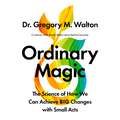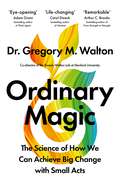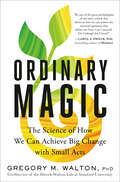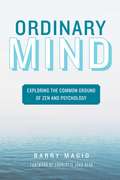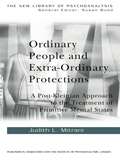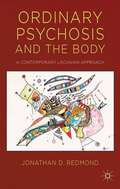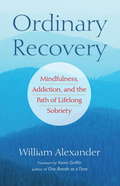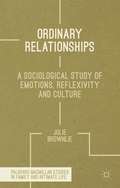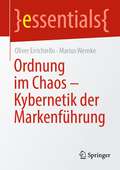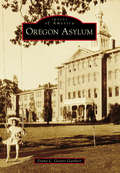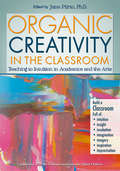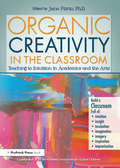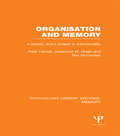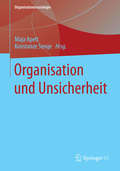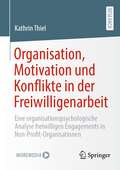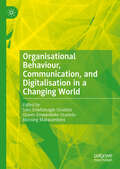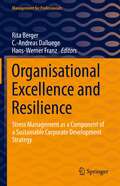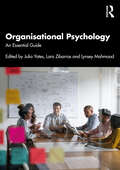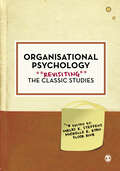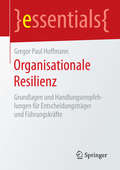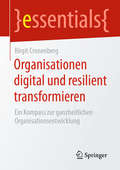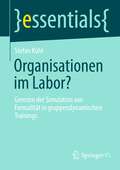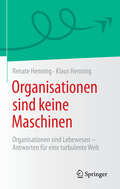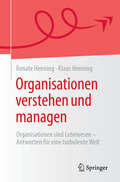- Table View
- List View
Ordinary Magic: The Science of How We Achieve Big Change with Small Acts
by Gregory Walton'By one of the great psychologists of our time, a book that shows us how we can answer the universal questions that define our lives: Can I succeed? Do I belong? Am I loved?' Carol S. Dweck, bestselling author of MindsetDiscover simple psychological shifts that build trust, belonging, and confidence--from the co-director of the Dweck-Walton Lab at Stanford UniversityThe emotional questions we face can define our lives. If you're expecting an interaction to go wrong, that expectation can make it so. That's spiralling down. But as esteemed Stanford psychologist Greg Walton shows, when we see these questions clearly, we can answer them well. Known to social psychologists as wise interventions, these shifts in perspective can help us chart new trajectories for our lives. They help us spiral up.This is ordinary magic: The everyday experiences that help us set aside the ordinary worries of life to unleash extraordinary change.Through vivid storytelling and insightful analysis of fascinating research Dr. Walton pulls back the curtain to reveal the magic at work:- With our children: The few choice words from a parent or a teacher that builds trust and achievement.- In our relationships: How the right opportunity to reflect, for just a few minutes before a conflict conversation, can engender greater intimacy among couples--even a year later.- In school: How learning that everyone feels as out of place at first as you do at a new school--they really do--can unleash extraordinary potential, improving your life a decade later.- In our policy: how a one-page letter reduced recidivism among kids returning to school from juvenile detention by 40 percentage points; a postcard campaign cut suicide rates in half.It's easy to think problems are out of our control. But in fact, we have vast opportunities for change. Ordinary Magic puts the tools for change at your fingertips.
Ordinary Magic: The Science of How We Achieve Big Change with Small Acts
by Gregory Walton'By one of the great psychologists of our time, a book that shows us how we can answer the universal questions that define our lives: Can I succeed? Do I belong? Am I loved?' Carol S. Dweck, bestselling author of MindsetDiscover simple psychological shifts that build trust, belonging, and confidence--from the co-director of the Dweck-Walton Lab at Stanford UniversityThe emotional questions we face can define our lives. If you're expecting an interaction to go wrong, that expectation can make it so. That's spiralling down. But as esteemed Stanford psychologist Greg Walton shows, when we see these questions clearly, we can answer them well. Known to social psychologists as wise interventions, these shifts in perspective can help us chart new trajectories for our lives. They help us spiral up.This is ordinary magic: The everyday experiences that help us set aside the ordinary worries of life to unleash extraordinary change.Through vivid storytelling and insightful analysis of fascinating research Dr. Walton pulls back the curtain to reveal the magic at work:- With our children: The few choice words from a parent or a teacher that builds trust and achievement.- In our relationships: How the right opportunity to reflect, for just a few minutes before a conflict conversation, can engender greater intimacy among couples--even a year later.- In school: How learning that everyone feels as out of place at first as you do at a new school--they really do--can unleash extraordinary potential, improving your life a decade later.- In our policy: how a one-page letter reduced recidivism among kids returning to school from juvenile detention by 40 percentage points; a postcard campaign cut suicide rates in half.It's easy to think problems are out of our control. But in fact, we have vast opportunities for change. Ordinary Magic puts the tools for change at your fingertips.
Ordinary Magic: The Science of How We Can Achieve Big Change with Small Acts
by Gregory M. Walton PhD&“By one of the great psychologists of our time, a book that shows us how we can answer the universal questions that define our lives: Can I succeed? Do I belong? Am I loved?&”—Carol S. Dweck, PhD, bestselling author of Mindset Discover simple psychological shifts that build trust, belonging, and confidence—from the co-director of the Dweck-Walton Lab at Stanford University The emotional questions we face can define our lives. If you&’re expecting an interaction to go wrong, that expectation can make it so. That&’s spiraling down.But as esteemed Stanford psychologist Greg Walton shows, when we see these questions clearly, we can answer them well. Known to social psychologists as wise interventions, these shifts in perspective can help us chart new trajectories for our lives. They help us spiral up.This is ordinary magic: The ordinary experiences that help us set aside the ordinary worries of life to unleash extraordinary change.Through vivid storytelling and insightful analysis of fascinating research—both his own and others&’—Dr. Walton pulls back the curtain to reveal the magic at work:• With our children: The few choice words from a parent or a teacher that builds trust and achievement.• In our relationships: How the right opportunity to reflect, for just a few minutes before a conflict conversation, can engender greater intimacy among couples—even a year later.• In school: How learning that everyone feels as out of place at first as you do at a new school—they really do—can unleash extraordinary potential, improving your life a decade later.• In our policy: how a one-page letter reduced recidivism among kids returning to school from juvenile detention by 40 percentage points; a postcard campaign cut suicide rates in half.It&’s easy to think problems are out of our control. But in fact, we have vast opportunities for change. Ordinary Magic puts the tools for change at your fingertips.
Ordinary Mind
by Charlotte Joko Beck Barry MagidIs meditation an escape from--or a solution to--our psychological problems? Is the use of antidepressants counter to spiritual practice? Does a psychological approach to meditation reduce spirituality to "self-help"? What can Zen and psychoanalysis teach us about the problems of the mind and suffering? Psychiatrist and Zen teacher Barry Magid is uniquely qualified to answer questions like these. Written in an engaging and witty style, Ordinary Mind helps us understand challenging ideas--like Zen Buddhism's concepts of oneness, emptiness, and enlightenment--and how they make sense, not only within psychoanalytic conceptions of mind, but in the realities of our lives and relationships. This new paper edition of Magid's much-praised book contains additional case study vignettes.
Ordinary People and Extra-ordinary Protections: A Post-Kleinian Approach to the Treatment of Primitive Mental States (The New Library of Psychoanalysis #Vol. 40)
by Judith L. MitraniMany people come to analysis appearing quite 'ordinary' on the surface. However, once below that surface, we often come into contact with something quite unexpected: 'extra-ordinary protections' created to keep at bay any awareness of deeply traumatic happenings occurring at some point in life. Judith Mitrani investigates the development and the function of these protections, allowing the reader to witness the evolution of the process of transformation, wherein defensiveness steadily mutates into communication. She lucidly and artfully weaves detailed clinical with a variety of analytic concepts, and her original notions - including 'unmentalized experience' and its expression in enactments; 'adhesive pseudo-object relations' and the way in which this contracts and compares with normal and narcissistic object relations - provide valuable tools for understanding the infantile transference/countertransference and for the refinement of our technique with primitive mental states. Ordinary People and Extra-Ordinary Protections will prove stimulating and accessible in its style and substance to a broad analytic readership, from the serious student of psychoanalysis to the most seasoned professional.
Ordinary Psychosis and The Body
by Jonathan D. RedmondCurrent Lacanian ideas on psychosis have much to contribute to the complex and often surprising forms of psychotic symptomatology encountered in clinical practice. By focussing on the unique experience of individuals with psychosis, this book examines the centrality of body phenomena to both the onset and stabilisation of psychosis.
Ordinary Recovery: Mindfulness, Addiction, and the Path of Lifelong Sobriety
by William Alexander Kevin GriffinThe key to ongoing freedom from alcoholism or any other kind of addiction is right before us, here and now, in the ordinary and perfect present moment. The problem is that addictions are often the result of our efforts to escape living in the present in the first place. Bill Alexander's unique approach uses mindfulness, story, and meditation to help alcoholics and others learn to come back to the present moment and find healing there.Emerging scientific research suggests that mindfulness (a nonjudgmental awareness of our moment-to-moment experience) can help prevent addiction relapse. Ordinary Recovery is a revised edition of Alexander's book Cool Water, with a new foreword, a new preface by the author, updates throughout the book, and a new resources section.
Ordinary Relationships
by Julie BrownlieRecent theorizing tends to position ordinary relationships as something we have lost, yet the nature of these relationships is not seriously engaged with. Drawing on rich empirical data, this book questions epochal claims about contemporary emotional lives, setting out to be explicit about the nature of ordinary relationships.
Ordnung im Chaos – Kybernetik der Markenführung (essentials)
by Oliver Errichiello Marius WernkeDie Kybernetik ist eine Wissenschaft, um Informationen zu verstehen und systematisch zu nutzen. Als Thema der Kybernetik wird die Marke gerade in Zeiten der Beschleunigung und der unendlichen, globalen Warenmärkte zunehmend wichtiger. Denn Bestand hat nur, wer vermag, sein Muster im Zeitalter der Veränderung zu bewahren und immer wieder an die Erfordernisse der Zeit anzupassen. Dabei helfen weder Kundendaten noch kreative Ideen, sondern eine fundierte Kenntnis der strukturellen Funktionsweise aller Lebewesen – organischer und sozialer. Durch die Zusammenführung von Markensoziologie und Management-Kybernetik werden in diesem essential die unsichtbaren sozialen Anziehungskräfte verdeutlicht. Indem die übergreifenden Dynamiken aller (lebenden) Systeme dargestellt werden, lassen sich universelle Erkenntnisse gewinnen und planvolle Strategien entwickeln.
Oregon Asylum
by Diane L. Goeres-GardnerThe Oregon State Insane Asylum was opened in Salem on October 23, 1883, and is one of the oldest continuously operated mental hospitals on the West Coast. In 1913, the name was changed to the Oregon State Hospital (OSH). The history of OSH parallels the development and growth in psychiatric knowledge throughout the United States. Oregon was active in the field of electroshock treatments, lobotomies, and eugenics. At one point, in 1959, there were more than 3,600 patients living on the campus. The Oscar-winning movie One Flew Over the Cuckoo's Nest was filmed inside the hospital in 1972. In 2008, the entire campus was added to the National Register of Historic Places, and the state began a $360-million restoration project to bring the hospital to modern standards. The story of OSH is one of intrigue, scandal, recovery, and hope.
Organic Creativity in the Classroom: Teaching to Intuition in Academics and the Arts
by Jane PiirtoOrganic Creativity in the Classroom demonstrates an approach to teaching creatively-teaching to intuition-that is written by experienced, award-winning classroom teachers. Instead of focusing on divergent production skills such as fluency and flexibility, an outdated approach that dominates the field of creativity studies, this book includes helpful strategies that can be used to encourage students to become more creative within a specific domain. Teachers of writing, mathematics, science, social science, literature, foreign language, theater, songwriting, psychology, comparative religion, and arts education, among other domains, who infuse creativity and intuition into their classrooms share their practical advice using an insightful storytelling approach.
Organic Creativity in the Classroom: Teaching to Intuition in Academics and the Arts
by Jane PiirtoCreativity can be taught and nurtured, and we can build classrooms in which creativity thrives. This philosophy acts as a central thesis in a new book, Organic Creativity in the Classroom, edited by award-winning author Jane Piirto, Ph.D.This innovative collection of essays explores approaches to teaching creativity from the perspective of experienced educators and artists. The 23 authors have taught for more than 500 years combined, and in this book they share teaching stories and helpful strategies that can be used to encourage students to become more creative within specific domains. The authors include master teachers, curriculum theorists, holistic educators, and award-winning practitioners of writing, mathematics, science, social science, literature, foreign language, theater, songwriting, dance, music, and arts education, among other domains, who incorporate creativity and intuition into their classrooms. In this readable and lively book, they share their personal stories and practical advice for infusing creativity into the lives of students.
Organisation and Memory: A Review and a Project in Subnormality (Psychology Library Editions: Memory)
by Peter Herriot Roy McConkey Josephine M. GreenOriginally published in 1973, this volume looks at the organisation of memory data in, what at the time was termed, ‘mental handicap’. The first part surveys recent work in this important area, giving a general account of experiments and findings. The second part reports a particular piece of research on memory in people with learning difficulties, then called ‘subnormal individuals’. Very much of its time, in terms of the terminology, this was an important book for anyone concerned with people with intellectual disabilities and for experimental psychologists involved with the processes of memory.
Organisation und Unsicherheit
by Maja Apelt Konstanze SengeDas Buch ,,Organisation und Unsicherheit" geht der Frage nach, wie Organisationen in der Gegenwart auf Unsicherheiten reagieren. Diese Unsicherheiten können organisationsintern erzeugt werden oder aus der Organisationsumwelt resultieren. Aus unterschiedlichen theoretischen Perspektiven und anhand verschiedener empirischer Analysen zu Jugendämtern, Bildungseinrichtungen, High Reliability Organisationen und Organisationen des Finanzmarktes u. a. m. wird gezeigt, welche Konsequenzen sich aus zunehmenden Unsicherheiten für das Handeln in Organisationen und die Beziehungen zwischen Organisationen und Umwelt ergeben. Versuche, Unsicherheit zu vermeiden oder zu beseitigen, führen dabei - wie viele der Beiträge zeigen - zu neuen Unsicherheiten.
Organisation, Motivation und Konflikte in der Freiwilligenarbeit: Eine organisationspsychologische Analyse freiwilligen Engagements in Non-Profit-Organisationen
by Kathrin ThielKathrin Thiel untersucht in einer längsschnittlichen Studienreihe das Erleben von Konflikten in Non-Profit-Organisationen: Welche Auswirkungen hat das Konflikterleben etwa auf Zufriedenheit oder Bereitschaften zu weiterem Engagement? Und wie bedeutsam ist Konflikterleben dabei im Vergleich zu Motiven und ausgewählten Variablen der Organisationspsychologie, etwa Gerechtigkeitswahrnehmungen? In einer multimethodalen Studienreihe werden dazu über 1.700 freiwillig engagierte Personen verschiedener Non-Profit-Organisationen befragt. Die Befunde bestätigen die negativen Auswirkungen von Konflikten und damit die Notwendigkeit eines organisationspsychologischen Blicks auf Freiwilligenarbeit. Konkrete Ansatzpunkte für ein erfolgreiches Management von Freiwilligen in Non-Profit-Organisationen werden abgeleitet.
Organisational Behaviour, Communication, and Digitalisation in a Changing World
by Sam Erevbenagie Usadolo Blessing Makwambeni Queen Emwenkeke UsadoloThis book brings together leading scholars and practitioners in organizational behaviour and communication to explore the complex relationship between employees and their organisations and the associated workplace outcomes. This comprehensive volume provides insights, theories, and practical strategies to understand and address the multifaceted nature of organisational dynamics in the face of constant and accelerated change. The first section of the book delves into the theoretical foundations of organisational behaviour. Some of the contributors in this section offer a comprehensive analysis of the socio-cultural and psychological aspects that influence individual behaviour within organisations. Building upon this foundation, the subsequent sections of the book examine various dimensions of organisational behaviour, including leadership, teamwork, diversity, and conflict resolution. One of the focuses of this edited volume is the examination of emerging technologies and their effects on the operation of organisations. Hence, some of the chapters examine the management of employee-organisations using digital platforms and explore employee engagement, collaboration, the effect of organisational support, supervisor support, or lack thereof. By delving into the role of digital technologies in the context of a changing world, the book offers valuable insights into the development of contemporary organisations, especially how technology is leveraged to foster a sense of connectivity in dispersed work environments.
Organisational Excellence and Resilience: Stress Management as a Component of a Sustainable Corporate Development Strategy (Management for Professionals)
by Hans-Werner Franz Rita Berger C. Andreas DalluegePersonal stress has an enormous impact on organizational and employee performance. This book introduces the web-based diagnostic tool IMPRESS, which provides employees, managers and HR professionals with information about potential stress factors. The book describes the underlying methodology for this integrated approach and presents the tools and learning modules to support the methodology. A series of case studies from pilot implementations in companies and universities illustrate the application of the approach in a variety of work environments. The book is based on an international research project for a holistic approach to stress prevention by combining Human Systems Audit with the European Excellence approach as promoted by the Common Assessment Framework (CAF) and the EFQM Excellence Model. This approach is intended to contribute to organizational development that supports effective employee stress management.
Organisational Psychology: An Essential Guide
by Lara Zibarras Julia Yates Lynsey MahmoodOrganisational Psychology offers an accessible, engaging and practical introduction to this fascinating discipline. It explores the latest thinking, reveals surprising truths about the way we work, and explains how to craft a successful and fulfilling career in the field. Organisational psychology is a complex and dynamic field that focuses on human behaviour in the workplace, and explores how individuals, groups and organisations function. Structured in three parts, the book combines an overview of the field with effective advice on how to become a successful organisational psychologist. It offers a deep-dive into the British Psychological Society’s five core areas of organisational psychology: Psychological Assessment at Work; Learning, Training and Development; Leadership, Engagement and Motivation; Well-being and Work; and Work Design, Organisational Change and Development. Chapters include key academic and theoretical concepts, practical applications, future directions for the field, key learning points, and further reading. Written by highly qualified experts in the field, this text is ideal for both undergraduate and postgraduate students taking programmes or modules in organisational psychology or related topics, including work and business psychology and human resources, as well as human resources practitioners. This text will also be valuable for anyone interested in understanding how organisations function and the best ways to allow individuals and organisations to survive, thrive and flourish.
Organisational Psychology: Revisiting the Classic Studies (Psychology: Revisiting the Classic Studies)
by Michelle K. Ryan Niklas K. Steffens Floor RinkOrganisational Psychology: Revisiting the Classic Studies critically reflects upon 14 studies by researchers such as Gilbreth, French and Raven, Greenberg, and Schein, that have long been considered foundational. Written and edited by leading scholars, this book invites you to think about the limitations of the classic studies, put theory into practice, and consider, in-depth, the lasting impact of these key studies on the field today. Revisiting the Classic Studies is a series of texts that introduces readers to the studies in psychology that changed the way we think about core topics in the discipline today. It provokes students to ask more interesting and challenging questions about the field by encouraging a deeper level of engagement both with the details of the studies themselves and with the nature of their contribution. Edited by leading scholars in their field and written by researchers at the cutting edge of these developments, the chapters in each text provide details of the original works and their theoretical and empirical impact, and then discuss the ways in which thinking and research has advanced in the years since the studies were conducted. Niklas K. Steffens is Director of the Centre for Business and Organisational Psychology and Associate Professor at The University of Queensland. Floor Rink is Professor of Organisational Behaviour at the University of Groningen. Michelle K. Ryan is the inaugural Director of the Global Institute of Women’s Leadership, and Professor of Social and Organisational Psychology at The Australian National University.
Organisational Psychology: Revisiting the Classic Studies (Psychology: Revisiting the Classic Studies)
by Michelle K. Ryan Niklas K. Steffens Floor RinkOrganisational Psychology: Revisiting the Classic Studies critically reflects upon 14 studies by researchers such as Gilbreth, French and Raven, Greenberg, and Schein, that have long been considered foundational. Written and edited by leading scholars, this book invites you to think about the limitations of the classic studies, put theory into practice, and consider, in-depth, the lasting impact of these key studies on the field today. Revisiting the Classic Studies is a series of texts that introduces readers to the studies in psychology that changed the way we think about core topics in the discipline today. It provokes students to ask more interesting and challenging questions about the field by encouraging a deeper level of engagement both with the details of the studies themselves and with the nature of their contribution. Edited by leading scholars in their field and written by researchers at the cutting edge of these developments, the chapters in each text provide details of the original works and their theoretical and empirical impact, and then discuss the ways in which thinking and research has advanced in the years since the studies were conducted. Niklas K. Steffens is Director of the Centre for Business and Organisational Psychology and Associate Professor at The University of Queensland. Floor Rink is Professor of Organisational Behaviour at the University of Groningen. Michelle K. Ryan is the inaugural Director of the Global Institute of Women’s Leadership, and Professor of Social and Organisational Psychology at The Australian National University.
Organisationale Resilienz: Grundlagen und Handlungsempfehlungen für Entscheidungsträger und Führungskräfte (essentials)
by Gregor Paul HoffmannDieses Essential definiert und erläutert den Begriff der Organisationalen Resilienz auf Basis der aktuellen wissenschaftlichen Auseinandersetzung in groben Zügen. Der Autor leitet zudem Implikationen für die praktische Führungs- und Managementarbeit in modernen Volkswirtschaften ab und reflektiert die Praxis von Führungskräften. Dabei beschreibt er auch das Konstrukt der Organisationalen Resilienz, in welchem sowohl ein psychologisches, soziologisches und auch ein wirtschaftswissenschaftliches Verständnis zusammenwirken.
Organisationen digital und resilient transformieren: Ein Kompass zur ganzheitlichen Organisationsentwicklung (essentials)
by Birgit CronenbergDie digitale Transformation findet unverkennbar in allen Ebenen und Bereichen der Gesellschaft statt. Insbesondere für Unternehmen und Organisationen stellt sich die Frage, wie den Wandelanforderungen der digitalen Transformation widerstandsfähig und ganzheitlich begegnet werden kann. In diesem essential werden hierzu die jungen Trendkonzepte der digitalen Transformation und der organisationalen Resilienz mit ihrem aktuellen Forschungsstand dargelegt, entschlüsselt und in den Kontext einer ganzheitlichen Organisationsentwicklung integriert.
Organisationen im Labor?: Grenzen der Simulation von Formalität in gruppendynamischen Trainings (essentials)
by Stefan KühlIn gruppendynamischen Trainings wird viel über das Leben in Freundeskreisen, Liebesbeziehungen, Jugendcliquen, Wohngemeinschaften, Straßengangs, Terrorgruppierungen oder Kleinfamilien, aber kaum etwas über die Dynamik in Unternehmen, Verwaltungen, Ministerien, Armeen, Polizeien, Krankenhäusern, Universitäten oder Schulen abgebildet. In diesem Buch wird gezeigt, wie gruppendynamische Trainings den Übergang von einer Gruppe zu einer Organisation unterbinden – durch den Druck zur personenbezogenen Kommunikation, durch ihre Entmutigung der Ausdifferenzierung von Rollen, durch die Verhinderung von Hierarchien und durch eine Tendenz zur Diffusität der Themen.
Organisationen sind keine Maschinen: Organisationen sind Lebewesen - Antworten für eine turbulente Welt
by Klaus Henning Renate HenningWachsende Komplexität und Dynamik prägt diese Welt und auch die meisten Organisationen. Die damit verbundene zunehmende Turbulenz besser zu verstehen und zu meistern ist Anliegen dieses Buches. Es zeigt, dass Organisationen keine Maschinen sind, sondern als Lebewesen verstanden und gesteuert werden sollten. Die Autoren beschreiben, wie diese systemische Denkweise seit Mitte der 1940er Jahre in vielen Disziplinen zu finden ist und als kybernetischer Ansatz vernetzt ist mit den biologischen, soziologischen, psychologischen, technischen und chaostheoretischen Ansätzen. Schon das erste Mal, als wir Mitte der 80iger Jahre mit dem OSTO-Ansatz in Berührung kamen, hat es uns gepackt. Von nun an begannen wir Organisationen als Lebewesen, als soziologische Einheit, zu sehen und nicht als statisches, militaristisches Gebilde. Damals war das für uns etwas völlig Neues. Die Organisation als ein Lebewesen, dass sich verändern kann und nicht stehen bleiben muss in vorgegebenen Mustern zu betrachten, das ist eine Chance für Menschen in Organisationen, die in der immer turbulenter werdenden Welt zurecht zu kommen wollen und müssen.Die Auseinandersetzung mit den komplexen Zusammenhängen der jeweiligen Zeit waren für uns immer schon von großem Interesse. Während Klaus Henning Elektrotechnik studierte und Renate Henning Pädagogik besuchten wir in unserer Münchener Studienzeit beide die Hochschule für Politische Wissenschaften in München. Diese Kombination prägt unser Denken und Handeln bis heute.
Organisationen verstehen und managen: Organisationen sind Lebewesen - Antworten für eine turbulente Welt
by Klaus Henning Renate HenningDas zweite Buch befasst sich damit, wie man eine Organisation als lebenden Organismus darstellen kann – wohlwissend, dass es sich immer um eine Abbildung der Wirklichkeit, die nicht alle Aspekte der Wirklichkeit umfassen kann.
